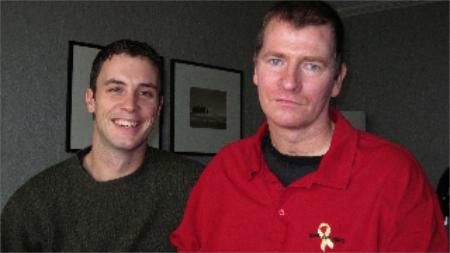Canada's Best
For many Canadians, the story of the Afghanistan war is personalized in Capt. Trevor Greene getting smashed on the skull with an axe in 2006, while talking peace with elders in the small village of Shinkay.
All Canada was horrified at what happened.
Canadians immediately shot the axe-wielder – a deranged teenager who’d probably been primed to attack. Platoon commander Capt. Kevin Schamuhn of the Princess Pats, called for a helicopter to evacuate his friend, who was a civilian-military cooperation officer, tasked with helping locals solve problems.
Greene was unconscious, and remained in a medically-induced coma – until reaching Canada, where he was not expected to recovery, but did anyways.
Over Remembrance Day and its associated ceremonies, he was on a tour of various Canadian cities and being feted as something of medical miracle as well as a dedicated humanitarian and, even, as an optimist about Afghanistan.
Traveling with him was his fiancé, Debbie Lepore (he’s determined to walk down the aisle at their marriage next summer) and Kevin Schamuhn, now based at Camp Gagetown, New Brunswick.
While Greene’s recovery is the stuff of miracles, the axe blow sliced into the part of the brain that controls motor functions. The use of his limbs is labored, but steady. He speaks distinctly, but slowly and so softly that old gaffers have to strain to hear.
Schamuhn often speaks for him. “We’ve become so close that our views of the world are almost parallel,” he says. “Yet we’re both optimistic for Afghanistan. We can only hope.”
“A global village,” interjects Greene, now involved in several humanitarian ventures around the world, including the True Patriot Love Foundation that supports the families of injured soldiers.
An unusual man, Greene now is writing a motivational book of his experiences to go along with a couple of books he’s written about missing women in Vancouver and Japan. A documentary about his travails has already won a Gemini Award.
So what about the “war” in Afghanistan? Personally, I’d trust the views of combat soldiers who know the people and do the fighting, more than I would the stated aims of generals and the platitudes of politicians. Forget the rantings of peace-at-any-pricers.
As a serving soldier, Capt. Schamuhn is careful with opinions (Greene has retired as a reserve officer with the Seaforth Highlanders). Both give the impression that 40,000 more soldiers in Afghanistan, as wanted by U.S. General McChrystal, might result in increased violence as they’d present more opportunities for Taliban attacks.
But more troops would also enhance village security. My impression was that as combat soldiers, they’d prefer not to be stretched as thin as Canadians have been.
As for the coming court martial of Capt. Robert Semrau, charged with “murdering” a severely wounded Taliban fighter who ambushed his patrol, Schamuhn found it is weird as I do that one of his men reported him. “I was responsible for having trained Semrau, and felt he was an excellent solider – better than most. All of us wondered who would have reported him.
Both felt it might have been a mercy killing, since Afghan troops are far more brutal on their own, and Semrau may have felt the patrol was too important to abort. He remains the first Canadian soldier charged with “murder” of an enemy on the battlefield.
The massacre at Fort Hood, to Greene can be summed up in one word: “Bizarre.” In a curious way, Muslim Maj. Nidal Hasan was doing to the 43 people he shot while apparently shouting “Allah Akhbar,” what the 16-year-old Afghan did to Trevor Greene when he whacked him with the axe.
Schamuhn clearly recalls that day. The axe-wielder was shot instantly, and all the gathered elders scattered like quail: “We think the guy was coached to do what he did.” Schamuhn later returned to the village, and it was in a state of disrepair.
The Afghan National Army (ANA) is a mixed bag. “Some tribes are fierce warriors, other tribes are the opposite.” But without a functioning army, there’s little chance for Afghan security. So “hope” is an ingredient all share.
Improvised explosive devices (IED) remain the hardest on nerves. Every trip outside camp is dangerous. And these IEDs can hurl a tank 20 yards. The whole country is an ambush waiting to happen.
The hardest time for soldiers is the last couple of weeks of their rotation – nerves frazzle. Of course some soldiers love the war environment. “We say of these types ‘Break glass in case of war’ - guys who amount to nothing at home, but over here excel and can’t get enough of war.”
In short, both Trevor Greene and Kevin Schamuhn are inspiring – in their respective ways, the best Canada has to offer - and recognized by the Prime Minister, the Governor General, the Chief of Defence Staff and all who meet them.


